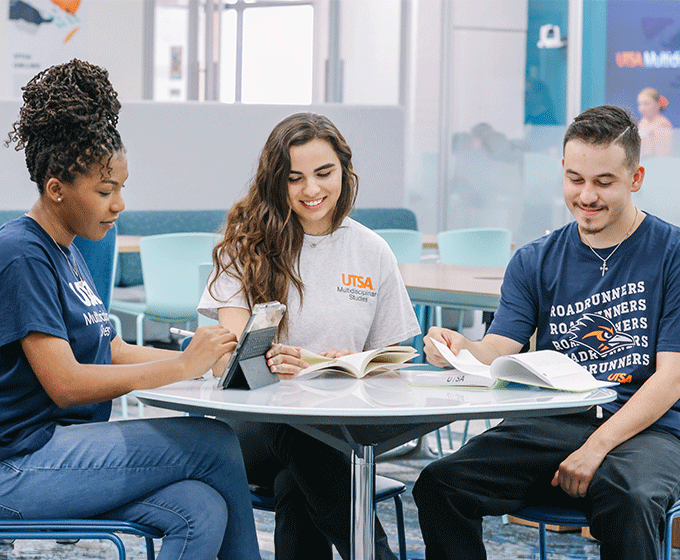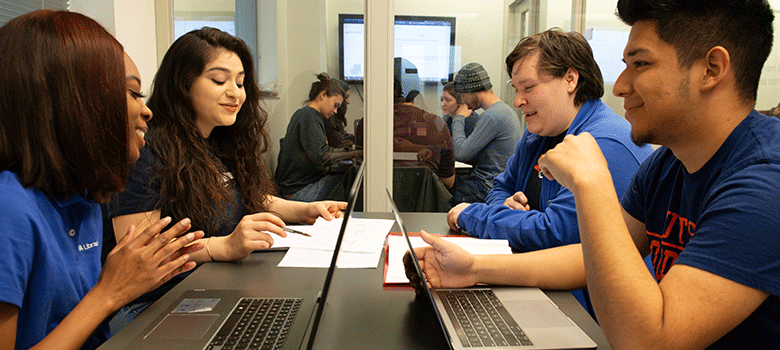
JULY 12, 2024 — UTSA students, faculty, staff and alumni can earn microcredentials at no cost to expand their skill sets, deepen their expertise and gain valuable experience through the university's collaboration with Coursera, part of a UT System initiative called Texas Credentials for the Future.
This partnership, which provides access to the Coursera Career Academy, represents the most extensive industry-recognized microcredential program from a U.S. university system.
The academy’s catalog includes more than 45 Professional Certificates from leading companies such as Google, IBM, Microsoft and Salesforce, equipping Texans with industry skills in a wide range of in-demand careers, such as data analyst, cybersecurity analyst, UX designer, application designer and social media marketer. Certification programs include hands-on projects and interactive assessments that allow students to apply new skills to real-world scenarios and practice using workplace tools.
“Perpetual change is the norm in today’s world and microcredentials are an important tool that help students adapt and thrive in an evolving workforce landscape,” said Tammy Wyatt, UTSA senior vice provost for student success and provost fellow. “By offering these credential programs to our entire UTSA community, we’re creating new pathways to prepare career-ready Roadrunners, helping our alumni expand their skills, and providing new professional development opportunities for faculty and staff.”

Coursera research found that 86% of U.S. students recognize that a microcredential could help them distinguish themselves from applicants when applying for jobs. Additionally, it found that employers are 75% more inclined to hire individuals who complement their degrees with a certificate.
UTSA psychology graduate Jocelyn Espinoza ’24 said that completing the Adobe certification program allowed her to expand her creative skills, kickstart a business and make her work stand out to a variety of audiences. Espinoza utilized her Adobe skills to create a professional research poster that she has used at several symposiums. After Commencement this past May, she traveled to the Netherlands to share research she conducted as part of the UTSA/U.S. Air Force Research Lab partnership.
“It wouldn’t have been possible to do any of this without a microcredential in Adobe tools,” Espinoza said. “I got a lot of compliments on my poster; I’m really proud of what I was able to do with it.”
The Texas Credentials for the Future initiative aims to equip students, faculty, staff and alumni from all UT System institutions with the skills necessary to meet the evolving demands of the modern workforce. This initiative, which includes the collaboration with Coursera, focuses on providing industry-recognized certifications in high-demand fields, ensuring that learners are prepared for the competitive job market. By integrating these microcredentials into academic programs, the UT System fosters a culture of continuous learning and professional development, positioning its community for sustained success and growth.
The Coursera partnership is one of several microcredential programs initiated by UTSA to offer focused learning experiences that complement existing academic degrees and expertise. These self-paced programs, which typically culminate in verifiable certifications or badges, are accessible from anywhere, empowering learners with the flexibility to develop new skills and knowledge at their convenience.
“Microcredentials can help higher education be nimbler in responding to big disruptions in industry and the workforce, like the emergence of generative AI,” said Melissa Vito, UTSA vice provost for academic innovation. “Microcredentials are an important part of UTSA’s holistic approach to preparing our students to be lifelong learners and filling critical needs in the workforce.”
UTSA Academic Innovation supported the rollout of the Coursera Career Academy and piloted an initial microcredential program with Google in 2022. The Academic Innovation team works closely with campus partners, faculty and students to integrate new academic technologies, respond to emerging trends in higher education and support faculty in identifying opportunities to incorporate microcredentials into curricula. As a result, participating faculty have provided students with a pathway to develop deeper expertise and earn a badge or certificate they can add to their résumé.
By earning a microcredential badge or credential, students may have a greater ability to stand out to potential employers. A study conducted by UPCEA and Collegis revealed that 76% of business leaders perceive these certifications as an indication of a job candidate's commitment to enhancing their skill set. Additionally, 63% of these leaders associate microcredentials with the candidate's personal initiative, while 60% consider them an effective means of showcasing one’s competencies clearly. The American Association of Colleges and Universities (AACU) found that 68% of employers favor graduates who possess microcredentials for entry-level positions, underlining the value placed on additional certifications beyond the traditional degree.
Since its inception in August 2023, over 2,200 members of the UTSA community have engaged with the Career Academy platform.
UTSA students, alumni, faculty and staff can access Coursera Career Academy at utsa.edu/microcredentials.
UTSA Today is produced by University Communications and Marketing, the official news source of The University of Texas at San Antonio. Send your feedback to news@utsa.edu. Keep up-to-date on UTSA news by visiting UTSA Today. Connect with UTSA online at Facebook, Twitter, Youtube and Instagram.
Huddle Against Hunger is a fundraising competition with Texas State that benefits our Roadrunner Pantry. Donations this week will help UTSA earn additional prize monies provided by RBFCU.
In-Person and VirtualJoin UTSA Libraries for an update on federal public access policies and how the library can assist with compliance.
Virtual EventWe invite you to join us for Birds Up! Downtown, an exciting welcome back event designed to connect students with the different departments at the Downtown Campus. Students will have the opportunity to learn about some of the departments on campus, gain access to different resources, and collect some giveaways!
Bill Miller PlazaThere are many citation managers. Which one is right for you? This workshop will explain what a citation manager is and how it can help you organize your citations, insert citations as you write your paper, and generate your bibliography.
Virtual EventPubMed is an essential database for anyone conducting biomedical or health-related research. This workshop will teach attendees how to effectively navigate this free resource and locate peer-reviewed articles using advanced search features, MeSH subject headings, and Boolean operators.
Virtual EventIn this hands-on workshop, participants will learn to setup an EndNote library, save references and PDFs, and automatically create and edit a bibliography. Attendees are encouraged, but not required, to have EndNote already installed on a personal computer.
Virtual EventJoin UTSA Libraries and Museums to learn more about the publishing discounts available for UTSA researchers. Current agreements include Elsevier, Cambridge University Press, Wiley, and more. Bring your questions and feedback for the library as we continue to pursue partnerships with publishers to reduce costs for our researchers.
Virtual EventThe University of Texas at San Antonio is dedicated to the advancement of knowledge through research and discovery, teaching and learning, community engagement and public service. As an institution of access and excellence, UTSA embraces multicultural traditions and serves as a center for intellectual and creative resources as well as a catalyst for socioeconomic development and the commercialization of intellectual property - for Texas, the nation and the world.
To be a premier public research university, providing access to educational excellence and preparing citizen leaders for the global environment.
We encourage an environment of dialogue and discovery, where integrity, excellence, respect, collaboration and innovation are fostered.